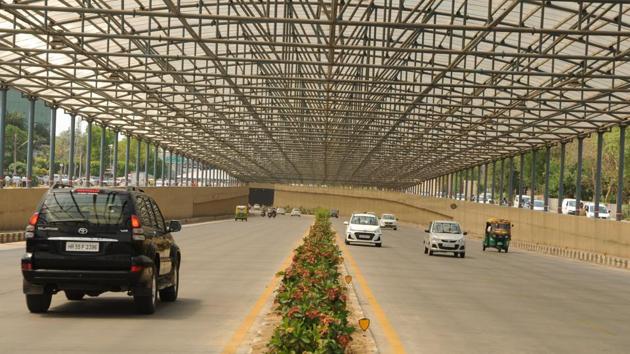Gurugram’s Iffco Chowk underpass reopens after 26 hours
NHAI officials closed the underpass, which was inundated with rainwater, around 4pm on Friday and reopened it around 6pm on Saturday.
The National Highways Authority of India (NHAI) reopened the Iffco Chowk underpass on Saturday evening, almost 26 hours after the road surface on both sides of the carriageway had collapsed following an hour-long spell of heavy rain.

NHAI officials closed the underpass, which was inundated with rainwater, around 4pm on Friday and reopened it around 6pm on Saturday. Officials of the NHAI said that while most of the repairs were completed by Saturday morning, clearing the high deposition of slush had become a time-consuming hindrance, which delayed the opening of the underpass.
“We completed most of the repair works, including fixing the canopy of the structure and levelling the cave-ins, around 2am. There were high deposits of slush and silt left inside the underpass after the rainwater had been drained. Since the cleaning work was labour-intensive, it took us significant time to complete it. We wanted to ensure the underpass is clear of any silt or slush, as it could lead to skidding of vehicles, which could cause accidents,” said Saurabh Singhal, a consultant with the NHAI.
Singhal said that 20 workers were employed for the cleaning work, besides roping in several tractors and water tankers. “Parts of the muck, which were solid, were lifted onto tractors and moved from the site. The slush was washed out with the help of water tankers. There is some exterior work left at the underpass, such as mending the gaps in the extension joints, by attaching a stiffener,” said Singhal.
He said they would complete it by Saturday night.
NHAI officials explained that ‘extension joints’ are essentially the attachment of the concrete wall of the underpass and its boundary wall, to support the structure. Gaps in the extension joints on Friday had resulted in large amounts of rainwater entering the underpass. A stiffener is similar to a metallic bolt, holding the two structures together, they said.
With the underpass being located in a low-lying area, NHAI officials also said that it remains vulnerable to flooding whenever there is heavy rain.
On Friday, rainwater flowing downstream from the direction of Sikanderpur entered the underpass from both ends leading to it getting flooded.
“While the eight 20 horsepower (HP) motor pumps inside the underpass kept running, we observed there was a high amount of rainwater that had entered from the Sikanderpur side. It (intensity of water inflow) was more than the capacity of the pumps. As a result, there was rainwater accumulation for a few hours. We are now trying to ascertain the various possible channels through which the drainage of the underpass can be linked to the Huda master drain to ensure there is proper output and permanently resolve the waterlogging issue,” said Singhal.
In September 2019, when the underpass was under construction, water had filled up to a depth of seven feet, threatening the foundation of the MG Road and a petrol pump located in the vicinity.
With most commuters unable to access the 750-metre L-shaped underpass that gives them direct access to the MG Road Metro station, when travelling from Iffco Chowk Metro station, there was congestion on the Mall Mile. “With the underpass being closed for repair work most of the day, a large number of commuters had to take a U-turn near Iffco Chowk to head towards the MG Road Metro station. As a result, traffic coming from two directions converged at the spot, resulting in congestion. It took commuters 5-10 minutes to navigate the 100-metre stretch,” said Tina Khanna, a resident of Sector 28.




